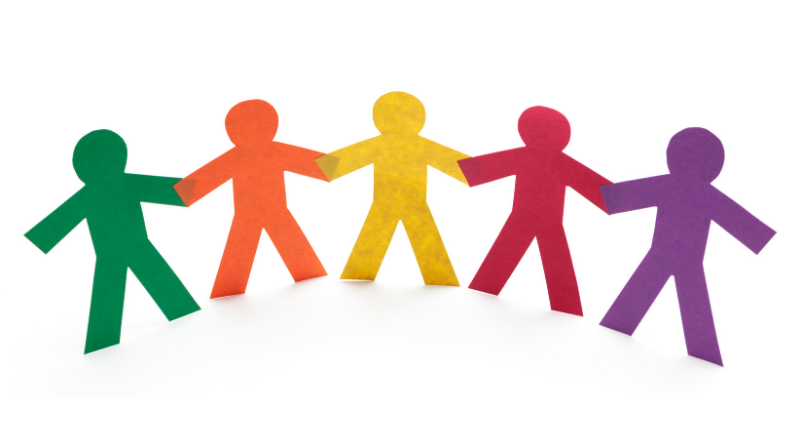A journey through equality, diversity and inclusion
When asked if I’d be interested in writing something. I thought, why not?
Then when it comes to the reality of having to commit ‘pen to paper’, the question is where to start. Because the area of equality, diversity and inclusion covers many things and is so vast it’s difficult to stick to one area.
I’ll start off with responding to: Are there questions you should never ask?
In my opinion, there are no questions which you can’t ask. It just depends on your motives and how you do it.
First of all, ask yourself, what do I know about equality, diversity and inclusion?
If the answer is, I know what the words mean then go on to the next questions.
Do I value equality, diversity and inclusion?
Do I know what the benefits of equality and diversity are for myself, my business or organisation?
Am I comfortable discussing issues of race, sex, age, transgender or disability?
I will come back to some of these questions.
Key concepts of equality, diversity and inclusion
So, in order to get ourselves a baseline, we need to ask the question. What do we mean by equality, diversity and inclusion?
In real terms, the key concepts of equality, diversity and inclusion are about promoting and respecting every individual’s right to be different.
As one of my learned colleagues often said when asked for a definition: ‘Equality is being asked to the party and inclusion is being asked to dance’.
There is key legislation such as the Equality Act, Human Rights Act and employment laws which protect individuals from discrimination and ensure that everyone is valued as an individual.
Equality, diversity and inclusion is a commitment by an individual, business or organisation to follow anti-discriminatory practices. They work to ensure that any instance of discrimination is eliminated.
It also ensures that staff, customers and service users receive fair and equal treatment regardless of race, age, sex, sexual orientation, disability, religion, marital status, gender identity, pregnancy or maternity (protected characteristics).
What does this mean in a professional environment?
It must be borne in mind that everyone acts differently at work to how they are at home. Whilst we would hope that everyone follows the same principles of non-discrimination and promotion of equality in their home life it is not reasonable or practical for an organisation to monitor the behaviour of people in their home environment. There are of course exceptions e.g. social media behaviour.
There are however clear parameters which everyone must agree to and abide by in the workplace. By entering employment you are in effect agreeing a contract with the organisation and you must follow their policies and procedures.
So what should we do?
- All people should be treated as individuals
- The impact of stereotyping is minimised
- All staff are valued for the different skills, qualities and attributes they bring
- All staff and service users are treated fairly with respect
- All staff and service users regardless of background or level of experience feel valued
- The organisation commits to all the above principles
The benefits of diversity
There are some key benefits of embedding equality and diversity in an organisation.
By creating a culture of respect in an organisation this benefits everyone in the workplace and ensures that we are all valued for what we bring to our organisation.
Research has shown where there is more diversity in the workplace, that teams are much more creative, and can problem solve quicker e.g. where an organisation is ‘taking on’ a wheelchair user for the first time. The team have to think through practical issues such as access to the building, is there a lift to where the worker is planned to be? If not, can they be based on the ground floor.
Of course, it is the law and by promoting and valuing equality and diversity then the organisation is complying with the law and therefore avoiding potentially damaging discrimination claims.
In turn, if an organisation is prosecuted under the Equality Act, then their reputation suffers, and potential employees may be put off applying for positions with them.
Having a diverse group of people better reflects society and in turn is reflective of our customers.
Therefore, it is the responsibility of every employee to support the organisation to promote equality and value diversity.
Some key gains
Gender diverse organisations have been shown to outperform less gender diverse organisations by up to 15%.
Ethnically diverse organisations can outperform less ethnically diverse organisations by up to 35%
It is clear that equality, diversity and inclusion matter
Some challenges
There are of course some challenges to making inclusion a reality and I have listed some of the key points below
- Organisations and staff need to be open to change and doing things differently
- To embrace difference there needs to be a recognition of the benefits of a diverse team, some organisations are reluctant to embrace this benefit
- Sometimes there is a reluctance of organisations, teams and staff to have a conversation about difference due to making the wrong comment, fear of offending or not knowing the correct terminology
- Stereotyping and unconscious bias can impact on the level of inclusion
- Organisations need to use time and resource collecting and monitoring key data/statistics linked to the protected characteristics
- Recruitment and selection processes need to rigorous and supported by trained interviewers
- Organisations may be hesitant in creating talent management programmes to embrace a wider range of staff. This can impact who joins the organisation and who gets promoted
- Pressure on budgets may prevent organisations using financial resources on what is viewed as not essential
Having begun to explore the world of equality, diversity and inclusion I would urge you to keep going on your journey.
Originally posted 2021-04-08 13:08:02.
- Nature’s problem solvers should be on your hire list - January 24, 2026
- The impact of a pandemic to learning - December 6, 2025
- A journey through equality, diversity and inclusion - October 27, 2025






